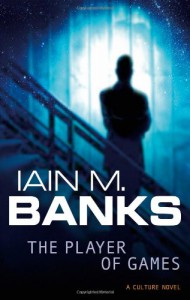23
Following
Nightgate Inn
A blog about fantasy and science-fiction books, new and old, popular and obscure.
Stay a while and listen...
 3 / 5
3 / 5The Player of Games , by Iain M. Banks, is a book about a very well-known and successful Culture player called Gurgeh and his effort to participate in a complex and all-encompassing game that defines and controls a whole cilivization. This is in a few words what the book is about. As always, I will avoid going into extreme details describing the synopsis of the book, you can read that up there ^. Instead, I will go straight into my review. Quick summary?: This is an interesting science fiction novel that deals a lot with adaptation and exploration of cultures and characters.
Format:
In my e-book version, the book had 295 pages. It contained 4 parts which (excluding the last one) were rather long. It is almost entirely in 3rd person perspective apart from some introductory snippets at the start of each part related in first person by an unknown narrator. I felt that the lack of shorter and more frequent chapters was not agreeing with my reading style.
Characters:
There are many characters throughout the novel but I felt that the main characters were two: Gurgeh and the drone. Which drone? Well, any one of them as Banks actually does an amazing job of giving each of them a distinct and easily recognizable personality! I can safely say that the drone characters were my favourite ones. Gurgeh, on the other hand, did not really appeal much to me. He was properly and carefully fleshed out but I still feel that some of his decisions and actions were not really justified or explained and he came off a bit of boring or annoying in a few circumstances. Still, maybe I’m just nitpicking here as Banks’ characters (both main and secondary ones) were generally well written, mostly interesting and felt diverse and realistic enough.
Plot & pacing:
Well, the main reason this book gets 3 stars and not more is the plot, which is not to say that it is bad or has faults. It’s just that I was expecting a bit more, some more mystery or more action or a grander epic scale or I don’t know, something to wow me. But it was about Gurgeh and about that complex super-game and its reciprocal effects on the structure and workings of a newly found civilization. There are some interactions among various characters and some subplots and other seemingly important happenings but it almost feels as if those are there just to break the monotony and the tedium.
The pace is ok considering the plot subject. Banks avoid wasting too much time on subsequent games after the first one is explained to grasp the ideas needed. I would actually argue that the pace is above-par and very well done for this subject and helps the novel move along at a quite nice rhythm.
Writing:
What I especially liked about Banks’ writing was that it was mostly clear and precise, easy to read, without creating confusion or misunderstandings. At the beginning there were of course many moments where the reader is left wondering whether he should be aware of certain things or ideas mentioned often but not long afterwards almost everything clears up. At the same time, the style is not one to amaze or give birth to buckets of quote-worthy material. Plain and functional would probably be the aptest way to describe it.
Science:
Since this is science fiction, I decided to spend a paragraph dedicated to comments about scientific concepts. Now, I’m not a physicist or astronomer, even though I have dabbled in both in the past, so I won’t comment on concepts about star travel, speeds, distances, communications and robotic artificial intelligence. I felt that Banks had an idea of what he was talking about and even if something was a bit too far-fetched maybe that’s just his vision of the far future.
What I will comment on though, as a molecular biologist who has studied ecology and astrobiology among others, is his biological concepts. The first one, the Culture’s and the Empire’s sexual divisions and workings didn’t bother me too much. Even though I thought it was roughly drawn and badly thought out I still believe it’s an interesting thought that gets some credit. What really bothered me enough to the extent of taking away half a star from the rating though, was the fireplanet’s (can’t remember its name right now) ecology system. I don’t even know where to start so I just won’t. Suffice to say it all felt totally bogus and ridiculous. Even the global fire and the world weather effects are completely unreasonable and difficult to accept. Ugh!!!
I know I should not be so critical since this is fiction but I can’t help it. Maybe that’s why I don’t read as much science fictions as I’d like!
Conclusion:
In short, I think this is an interesting SF book with a rather original subject that contains several novel concepts and ideas; some of them done really well, and some not so. If you are a passionate board-game player, you will find something you like. If you are an avid SF-reader, there are also things to enjoy here. If you are a literary aficionado that enjoys stunning wordcraft, I think you should pass this one. And if you’re a hardcore scientist, tread carefully and read at your own risk. It’s good enough, and I will probably read Banks’ 3rd Culture book, [b:Use of Weapons|12007|Use of Weapons (Culture, #3)|Iain M. Banks|https://d202m5krfqbpi5.cloudfront.net/books/1347522037s/12007.jpg|1494156], but it’s not great.
3 / 5



